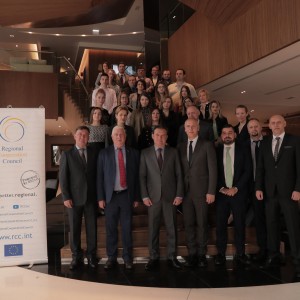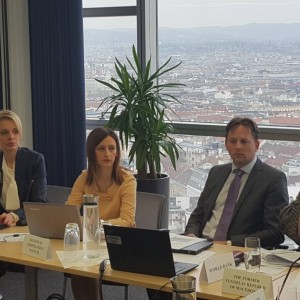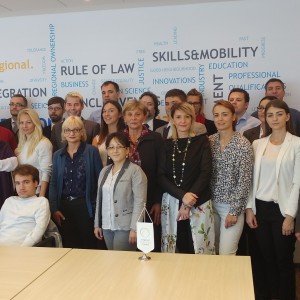Reforms, confirmed European perspective and development cooperation set base for advancement of South East Europe, says RCC head at Western Balkans conference in Brussels
09 December 2009

RCC Secretary General, Hido Biscevic (first left, pannel), at the conference 'The Western Balkans: Overcoming the economic crisis - from regional cooperation to EU membership', Brussels, 9 December 2009. (Photo/EC audiovisual service)
BRUSSELS – “The EU enlargement process must continue to be based upon the principle of fulfilment of accession criteria, on one hand, and on full confirmation of the European perspective for all countries of South East Europe, on the other“, said Hido Biscevic, Secretary General of the Regional Cooperation Council (RCC), at a high-level conference on the Western Balkans, held in Brussels today.
The conference “Western Balkans: Overcoming the economic crisis – from regional cooperation to EU membership” focused on the financial and economic situation in South East Europe and discussed the importance of regional cooperation in overcoming the economic crisis. It was organized by the Swedish EU Presidency and the European Commission (EC), in cooperation with the RCC.
“By contributing to the organization of this conference, the RCC aligned itself with those who recognize the call of the moment, the historical call, to move the Western Balkans forward on the EU accession road, building on the achievements from within the region and unequivocal commitments from the EU”, said Biscevic.
The participants signed a declaration on the establishment of the Western Balkans Investment Framework, to address the region’s investment needs. It consists of two key components: Joint Grant Facility, which will pool grants from the EC budget, international financial institutions (IFIs) and bilateral donors; and Joint Lending Facility, based on the loans provided by IFIs – the European Investment Bank, the European Bank for Reconstruction and Development and the Council of Europe Development Bank.
“Accelerated economic development must become a regionally owned and internationally supported platform to address the long standing economic needs of South East Europe, and to respond to the harsh consequences of the current economic and financial crisis. Common projects, in infrastructure, energy, transport, inland waterways, railway systems, etc., need to be pooled by our countries and serve as a stimulus to national economies. They would also greatly contribute to general stability in the region and provide a back-up to the accession related reforms”, added Biscevic.
Swedish Foreign Minister Carl Bildt highlighted the importance of regional cooperation, both in itself and in terms of advancing the European agenda.
“The ability and the will for regional cooperation demonstrate the will for reconciliation and integration. In concrete terms, a lot can be done to modernize significant energy resources in the Western Balkans in infrastructure, transport communication, electricity power, gas, to avoid possible shortage of power in the region in the next few years. The Regional Cooperation Council is the vehicle for bringing countries of the region together to discuss all of these issues.”
EU Commissioner Rehn underlined that the EU perspective and improved regional cooperation are essential to help pull the countries of the Western Balkans out of a negative economic spiral of the global economic crisis.
“The regional cooperation should not only be seen in terms of export markets, but also as a chance to combine inputs and know-how from the region in order to succeed on global markets. Therefore, the countries of the region are well advised to accelerate labour and product market reforms, to enhance the quality of public spending and to improve the business climate. Those reforms will improve the attractiveness of the Western Balkans to foreign investors, support the recovery phase and promote growth.”
Participants exchanged views on the future steps that may be taken in order to enhance regional cooperation. Some concrete initiatives were put forward such as the proposal by Božidar Djelić, Serbian Deputy Prime Minister, for the countries of the region to work together on reconstruction the regional railway system or to jointly appeal to the Multi-beneficiary Instrument for Pre-accession Assistance funds to meet national budgetary requirements needed for the reforms in the social sector, e.g. health care, pensions, etc.
The discussants also emphasized that the countries of South East Europe need to work on developing the regional strategy to raise awareness of the potentials of the Knowledge Based Economy model as a driving force for engaging educated young generations in the economic development of the region.
Other speakers included: Dario Scannapieco, Vice President, the European Investment Bank; Varel Freeman, First Vice President, the European Bank for Reconstruction and Development; Jane Armitage, Director for South East Europe, World Bank; Imre Tarafás, Vice-Governor, the Council of Europe Development Bank; Ardian Fullani, Governor of the Bank of Albania; Michael Leigh, Director General for Enlargement, European Commission; Marco Buti, Director General for Economic and Financial Affairs, European Commission; Vesna Pusic, Chair of the Parliamentary EU Committee, Croatia; Pierre Mirel, Director, Directorate General for Enlargement, European Commission; Radmila Šekerinska, Chair of the National Council of European Integration, The Former Yugoslav Republic of Macedonia; Vladimir Gligorov, from the Vienna Institute for International Economic Studies; and Ivan Vejvoda, Executive Director of the Balkans Trust for Democracy, Serbia.
Foreign ministers, governmental officials and experts from EU Member States, the Western Balkans and other countries, high level participants from international financial institutions, journalists and representatives of think-tanks, participated in the conference.
Address by the RCC Secretary General, Hido Biščević, at the Conference”Western Balkans: Overcoming the Economic Crisis – From Regional Cooperation to EU Membership“is available HERE.
More information about the conference is available HERE.



